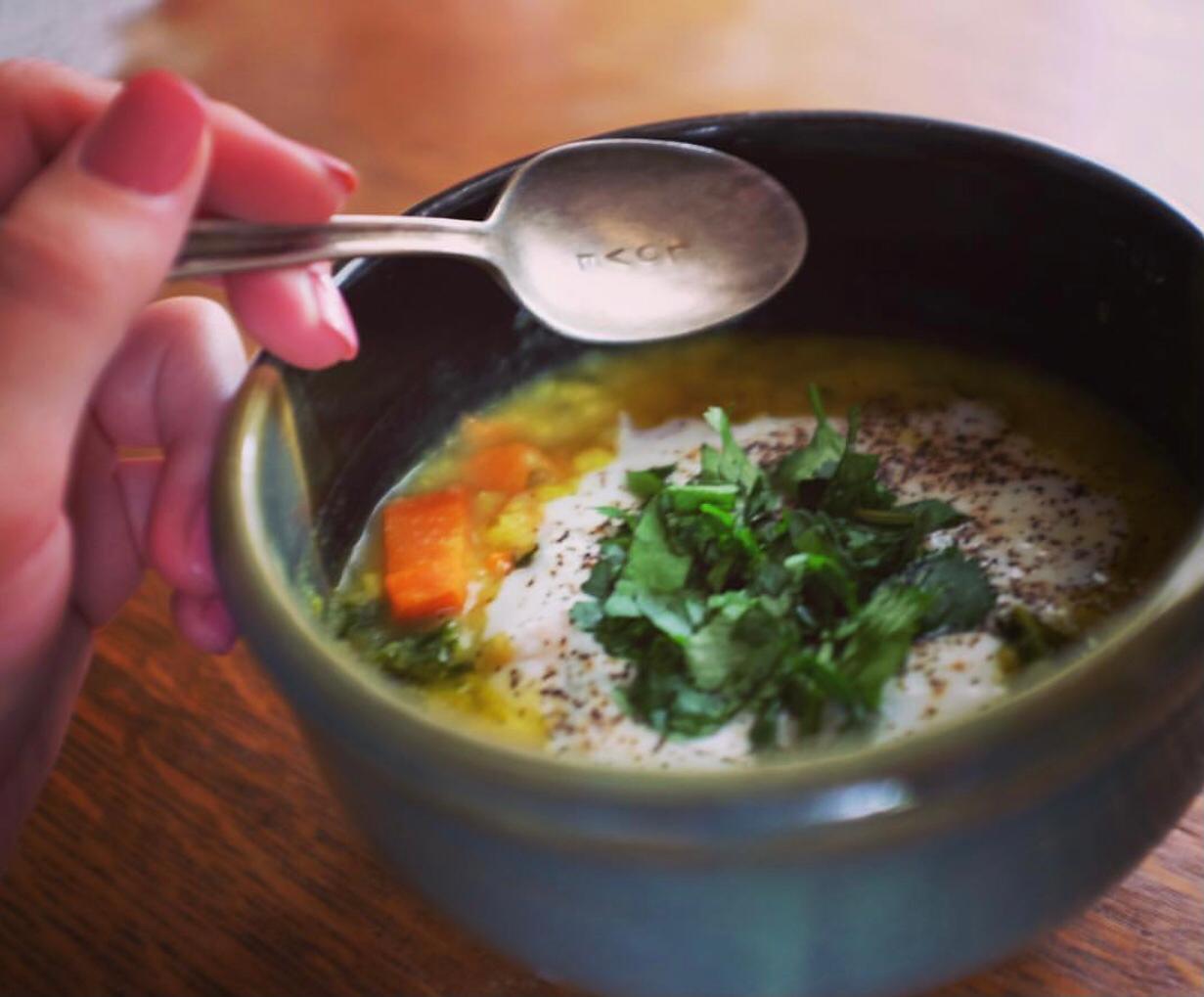
A 3 Day Digestive Reset with Ayurvedic Kitchari
As we embark upon the new year, there is societal pressure to have a new year’s resolution. In our culture, many times resolutions center around trying the latest fad diet, yoga challenge or 30 day weight loss program. These “New Year, New You!” incentives unfortunately can set wildly high expectations of how you need to suddenly change yourself and be better. To this unnecessary pressure, we say- “no thank you!”.
There are a couple of reasons why we politely decline these incentives. First and foremost, we do not support any resolution rooted in self-judgement or self-criticism because it cultivates toxic thinking and behavior. There is nothing you need to fix about yourself, don’t buy into the hype! Instead, we encourage you to ask yourself the following questions:
-What were 2020’s biggest challenges?
-How did these challenges expand your awareness, consciousness and spiritual growth?
-What makes you come alive?
-What supports you to be your most authentic self?
At the dawn of a new year, reflecting on questions such as these have the potential to initiate profound positive growth and expansion...and guess what? There is no timeline or deadline for figuring these questions out! Let go of the pressure to be the best version of yourself in 30 days or by the spring of this new year. Our whole lives are meant for us to learn, grow and expand. With this in mind, we encourage you to ponder, reflect, move slowly and with ease as we transition into 2021.
The second reason we do not support societal pressure to have a new year’s resolution is, well, Ayurvedically speaking, it goes against the circadian rhythm of nature. During the month of January in the Northern Hemisphere, it is winter and vata dosha is abundant in the environment. This means that, during this time of year, vata dosha can be easily imbalanced by drastic change, a light, dry diet and unrealistic expectations on a personal and professional level. Not to mention, we are coming out of 2020 and, as a global community, vata dosha is already in excess due to the physical and emotional stress brought on by the coronavirus pandemic, record breaking wildfires and the other unfortunate events of the past year. When you combine all of this with a high pressure new year resolution, you may be setting yourself up for a vata type meltdown, pitta type burnout or kapha type disappointment!
Taking all of the above into account, if you’re anything like us, these past couple of weeks, you may have enjoyed some sugar, caffeine and a cocktail or two to celebrate the holidays and bid adieu to 2020. After all, we all gotta enjoy ourselves and live in the moment and the end of the year is a fabulous time to do just that. Ayurvedic philosophy even cites kama, the Sanskrit word for enjoyment, as one of the Four Goals of Life; thus, enjoyment is key to bliss and contentment. Yet, if too much of a good thing happens, you could be walking away from the holidays feeling heavy, sluggish, unmotivated or with a case of the winter blues due to an intake of too much sugar, caffeine, alcohol, processed foods or some serious couch surfing! If you are feeling this way, instead of throwing yourself into a military style fitness boot camp designed to meet a new year’s goal or resolution, what about creating more time for self-care, reflection and nourishment through a 3 Day Kitchari Digestive Reset? This reset is a type of gentle cleanse designed to restore digestion and nourish your entire being through moderate exercise, whole foods, balancing spices, healing beverages and daily self-care rituals. It is a lovely alternative to the typical new year resolution because it creates space, builds clarity, understanding, self-care and self-love which all can help connect you with your highest self in 2021 and beyond.
WHAT IS KITCHARI?
If you are not familiar with kitchari, it is an Indian dish of split mung beans and basmati rice traditionally prepared with ghee, digestive spices and freshly cooked vegetables. In terms of the doshas, kitchari is balancing to vata, pitta and kapha, therefore, making it a tridoshic meal. Its abundance of healthy fats, carbohydrates and protein will keep you feeling satiated and energized throughout the day, making it an ideal food to have during a mono-diet or cleanse. Here are a few more reasons why kitchari is the go to Ayurvedic cleansing dish:
HEALS & ENHANCES DIGESTION (AGNI)
When you eat a mono-diet of kitchari, each meal is simple and easy to digest. This gives the digestive system time to restore and reset any unhealthy food addictions after potentially being taxed during holiday feasts. Also, kitchari contains digestive spices which rekindle jathara agni or your digestive fire. When agni is healthy, you have the ability to digest and assimilate the nutrients from your food optimally as well as reduce and even eliminate toxic residue (ama) left behind from weak or low agni.
REDUCES TOXIC BUILD-UP (AMA)
As Dr. Vasant Lad explains, mung beans have an astringent taste which enables them to pull toxins from the digestive tract. Astringency can also be found in foods like raw spinach, kale and other greens, this is what gives these foods their purifying properties. However, when compared to raw leafy greens, cooked mung beans have a gentle, detoxifying action. This makes cooked mung beans ideal for an Ayurvedic cleanse, especially during the cold, dry winter months of vata season when it is important to keep the body feeling warm and nourished.
IMPROVES ENERGY & VITALITY
The end result of a kitchari cleanse or mono-diet is improved energy and vitality thanks to the digestive reset, nourishment and detoxification which has taken place. After this mono-diet is complete, there should also be greater clarity and ability to focus since any kapha-like congestion or heaviness has been expelled.

WHAT TO DO BEFORE THE 3 DAY KITCHARI DIGESTIVE RESET
1-2 WEEKS BEFORE
One or two weeks before you begin the 3 Day Kitchari Digestive Reset, whittle down your intake of processed foods, sugar, caffeine and alcohol. It is ideal if you can eliminate all of the above by the time your cleanse begins. Again, you do not want this to be a drastic change, instead, give yourself adequate space and time to let go of these substances.
PLAN AHEAD & CLEAR YOUR SCHEDULE
This reset is designed to balance the three doshas by reducing stress, heated emotions, feelings of lethargy and restoring balance to agni and the entire digestive system. In order to receive the maximum benefits, make sure you pick 3 days where you have a light schedule with little to no work, no social commitments and nowhere you have to be. This will help you keep your stress levels low and any temptations out of sight! Of course, this is the best-case scenario. If it is not a reality for you, that’s okay too! Our advice would be to choose a weekend where you can spend the first day or two of your cleanse at home, allowing you to begin with ease. In short, you want your 3 days to be as stress-free as possible, creating time for you to turn inward, nourish with delicious, simple food, practice self-care and have no to-do list.
GATHER YOUR SUPPLIES & DISCOVER YOUR DOSHA
After you have chosen your 3 days based on your schedule, determine from the recipes and lists below which foods, spices and Ayurvedic self-care items you need to gather in order to be prepared for the cleanse.
If you are not familiar with the doshas or what your unique blend of the doshas is, now would be a good time to take our Discover Your Dosha Quiz. This quiz will help you decide which fruits, vegetables, milk, teas, nuts and seeds to enjoy during your digestive reset.
CONTRAINDICATIONS
If you are pregnant, breastfeeding, on your moon (menstruating), recovering from illness, feeling weak or debilitated or experiencing a time of immense emotional or physical distress, cleanses of any kind are not recommended. If you have any concerns, take prescription medication or have a serious disease, please consult your physician before undergoing any cleanse.
THE 3 DAY KITCHARI DIGESTIVE RESET MENU & RECIPES
During the 3 day cleanse, prepare your meals fresh each day to ensure they contain the maximum amount of prana or life force energy. We suggest soaking your split mung beans overnight for use the next day. This will ensure optimal digestion.
BREAKFAST
For breakfast, you can either choose from Ayurvedic Oatmeal or Tridoshic Kitchari.
LUNCH
For lunch, enjoy Tridoshic Kitchari with vegetables specific for your dosha.
DINNER
For dinner, prepare Tridoshic Kitchari with vegetables specific for your dosha.
SNACKS
During the cleanse, fresh fruits, nuts and/or seeds specific for your dosha can be eaten.

AYURVEDIC OATMEAL RECIPE
INGREDIENTS:
⅔ cup dry oats
2 cups of water
¼ teaspoon salt
1 heaping tablespoon ghee (or coconut oil)
¼ cup dates
¼ teaspoon cardamom powder*
¼ teaspoon cinnamon powder*
*you can also substitute the spices for ½ teaspoon of our Golden Milk spice blend!
DIRECTIONS:
Place oats, dates, salt, ghee and water in a small saucepan and bring to a boil. Reduce heat to low and add the cardamom and cinnamon or Golden Milk spice blend. If you desire to add fresh fruit for some variety and more sweetness, you will add this now so the fruit can cook with the oatmeal, making it easy to digest. Please refer to the dosha specific fruits which are listed below. Cook on low until oats are cooked entirely, anywhere between 5-10 minutes.
Add a splash of dairy or nondairy milk (see dosha-specific milk list below) after the oats have cooked through to give the oats a nice creamy texture.
FRUITS TO INCLUDE IN YOUR OATMEAL:
Vata: apples (cooked), bananas (ripe), figs, peaches, pears and strawberries (ripe)
Pitta: apples, blackberries, blueberries, coconut, cranberries, figs, strawberries and raspberries
Kapha: dried fruits like dried apples, cherries, cranberries and raisins
Tridoshic: apricots, blackberries, blueberries, peaches, pears and raspberries
MILK TO INCLUDE IN YOUR OATMEAL:
Ayurveda recommends raw organic cow’s milk for all doshas. If you are looking for nondairy milk alternatives, they are as follows:
Vata: almond, sesame or oat milk
Pitta: coconut milk
Kapha: rice milk
Tridoshic: almond, coconut or rice milk

TRIDOSHIC KITCHARI RECIPE
INGREDIENTS:
½ cup basmati rice (rinsed)
½ cup split mung beans (soaked in a bowl of water overnight)
2 tablespoons ghee (or coconut oil)
½ teaspoon fennel seeds
1 teaspoon cumin seeds
1 teaspoon coriander seeds
½ teaspoon fenugreek powder
½ teaspoon ginger powder
½ teaspoon black pepper powder
1 tablespoon turmeric powder
1 pinch garlic powder or hing/asafoetida
6 to 10 cups water
½ teaspoon sea salt
*you may substitute the fennel, cumin and coriander seeds with our Tridoshic Spice Blend or you can make this recipe dosha-specific by using one of our Dosha Spice Blends.
DIRECTIONS:
Drain the split mung beans from their water and combine with rice.
Wash rice and split mung beans until the water is clear then drain.
Warm ghee in a medium saucepan on medium-low heat. Add fennel, cumin and coriander seeds and sauté until the seeds begin to pop. Add more ghee if necessary then add the fenugreek powder, black pepper powder, ginger powder, turmeric powder and garlic or hing powder into the pan and mix all together. Next, add rice and split mung beans and sauté for 1-2 minutes. Add 6 cups of water to the pan and bring to a boil. Once the kitchari has come to a boil, cover and reduce the heat to a low simmer. Allow the kitchari to cook for 20 minutes then add any vegetables of your choosing from the list below and cook for another 20-30 minutes. As the kitchari cooks, you can continue to add water as necessary to keep the mixture moist and stew like. Before serving, taste test your kitchari and season to taste.
Optional: Garnish with fresh, chopped cilantro leaves, diced avocado, a squeeze of lemon and chutney.
VEGETABLES TO INCLUDE IN YOUR KITCHARI
Vata: acorn squash, carrots, mustard greens, parsnips, turnips, sweet potatoes and winter squash
Pitta: asparagus, broccoli, chard, celery, collard greens, dandelion greens, kale, sweet peas, spinach, summer squash and zucchini
Kapha: asparagus, broccoli, cauliflower, carrots, chard, collard greens, kale, mustard greens, onions, parsley, peas and spinach
Tridoshic: asparagus, green beans, cauliflower, broccoli, carrots, kale, leeks, mustard greens, sweet potatoes, pumpkin, yellow squash, acorn squash, winter squash, turnips and spinach
SNACKS
In NO way is this cleanse meant to deprive you! Quite the opposite, this cleanse is designed to nourish, detoxify and heal you. Thus, when you feel like reaching for a snack, please enjoy either dosha specific fresh fruit or nuts and seeds.
FRUITS TO SNACK ON
Vata: apricots, apples (cooked), bananas (ripe), blackberries, cantaloupe, dates, figs, grapes, mangoes, nectarines, papaya, peaches, pears (ripe), persimmons, strawberries (ripe) and tangerines
Pitta: apples, blackberries, blueberries, cantaloupe, coconut, cranberries, dates, figs, grapes, nectarines, prunes, raisins, raspberries and strawberries
Kapha: dried fruits as well as Granny Smith apples, cherries, cranberries, grapefruit, mandarins, oranges, pomegranate, prunes and raisins
Tridoshic: apricots, blackberries, blueberries, cherries, dates, grapefruit, grapes, jujube, mango, nectarines, oranges, papaya, peaches, pears, pineapple, plums (sweet), pomegranate, raspberries and watermelon
NUTS & SEEDS TO SNACK ON
Vata: almonds, brazil nuts, cashews, pecans, pistachios and walnuts
Pitta: pumpkin seeds and sunflower seeds
Kapha: pumpkin seeds and sunflower seeds
Tridoshic: pumpkin seeds, pine nuts and sunflower seeds
DIGESTIVE TEAS
Please visit our blog, Dosha Specific Digestive Tea Recipes for Optimal Health, to make your own herbal teas to sip on throughout the cleanse. Alternatively, explore our Ayurvedic, organic loose leaf teas.
THE DAILY RITUAL
During the 3 days of your digestive reset or cleanse, take the opportunity to embrace dinacharya! Dinacharya is the Sanskrit term for daily Ayurvedic rituals or routines which detoxify, support and balance you physically, mentally and spiritually. Through consistent dinacharya, one can harness health and vitality, keep the body free from dis-ease and have the space, enthusiasm and clarity to fulfill one’s dharma or life’s work. Sounds pretty cool right? We think so too. So let’s begin!
MORNING DINACHARYA
- Awake just before sunrise to reconnect with the natural rhythms of nature.
- Upon waking, clean the tongue with your PAAVANI Copper Tongue Cleaner to help expel ama and stimulate agni. Follow tongue cleaning with your favorite Pulling Oil and follow with brushing and flossing your teeth.
- At this point, you may move onto drinking 8oz of hot lemon water to continue the detoxification process and awaken agni.
- Next, make time for morning meditation and pranayama to focus the mind, set intentions and begin your day from a place of balance and clarity.
- Grounding movement practices such as gentle yoga, a walk in nature or tai chi can be practiced to help connect with the body, calm the mind and continue stimulating agni (digestion).
- Practice abhyanga with your favorite PAAVANI Body Oil.
- Take a shower.
- Prepare your morning Digestive Tea or PAAVANI Herbal Tea along with your breakfast.
- Incorporate 1 new Ayurvedic Guideline for Healthy Eating into your day.
- Enjoy your nourishing breakfast, ideally between the hours of 7-8am.
AFTERNOON DINACHARYA
- Take this time to do something you love! That may be journaling, creating a vision board for 2021, reflecting on the questions we posed at the beginning of this article, reading your current book, crafting, building, creating, listening to music, dancing, snuggling with your fur babies, spending quality time with your family...the list goes on. The point is that you want to have these 3 days consist of activities which evoke joy, passion and connect you with your innermost self. Also, keep in mind, your body is going through a gentle detoxification process; thus, seek out daily activities that are calming and relaxing, this way, you do not expend an excess amount of energy and your body can use that energy to heal and replenish.
- Enjoy lunch between 12-1pm.
- If you desire a snack at any point between meals, eat it at least one hour away from meal time.
- Continue to stay hydrated with our PAAVANI Hydrate Tea Blend.
- Drink at least half your body’s weight in ounces of water each day. This means, if you weigh 140 lbs, you would drink at least 70 ounces of water per day.
- Surrender to rest and relaxation!
EVENING DINACHARYA
- Enjoy dinner between 6-7pm.
- Half an hour before bedtime, take ½ teaspoon of Triphala with ½ cup tepid water. Triphala supports detoxification, elimination and bolsters the immune system. Learn more here.
- Draw yourself a luxurious Coconut Milk Bath!
- Brush and floss those pearly whites.
- Make your way to bed by 10pm or sooner in order to get a restful night’s sleep. Sleep is essential during this digestive reset because it gives your body and mind an opportunity to cleanse, renew and restore.

POST-CLEANSE/RESET
Once your 3 day reset is complete, you may notice that you continue to detoxify and process both physical and emotional toxins. Our advice is to take it as slowly as possible in all aspects of your life and have compassion for your experience. When you start to incorporate different foods back into your diet, allow the 15 Ayurvedic Guidelines for Healthy Eating to light the way. With these ancient recommendations as your guide, you can stay motivated and inspired to eat wholesome foods in a mindful way. Also very important, as you slowly begin to diversify the foods you eat, opt for fresh fruits and veggies instead of processed or premade foods. You’ve come so far in just 3 days by cleansing your body and restoring your agni, so allow these prana rich foods to continue the good work you have just done! Lastly, after your 3 day reset, your work and social schedule will surely begin to fill up; however, we encourage you to move slowly and continue to set healthy boundaries. By staying mindful and honoring the wisdom of Ayurveda, the gifts of your digestive reset will ripple out into your everyday life, creating a more harmonious and sattvic energy within you and your environment.
Wishing you a very happy new year, filled with space to embody your authentic self and dive into deeper aspects of your body, mind and spirit!





2 comments
@MYRIAH Thank you for your message and you are most welcome for all of the kitchari information. We agree, going somewhere specifically for a digestive reset where all the preparation and cooking is done for you makes a kitchari cleanse very easy to do. To support you in an Ayurvedic cleanse, we suggest booking an online Ayurvedic consultation with our in house Clinical Ayurvedic Specialist, Laurel Odom. Also, our friends over at Cultivate Balance lead a program called “Reset for Resilience” and included within the course is a 5 day guided kitchari cleanse. We hope this information is helpful to you and your healing journey!
PAAVANI Ayurveda
Would be incredible if there was a kitchari cleanse weekend retreat to help us who struggle doing this on our own. I have been trying to eat nothing but rice beans spices for the last 3 weeks. Some days started with stewed apples and raisins with nuts as a snack and my skin got worse. Removed the fruit skin is very slowly getting better. Ever since I added rice, beans and the spices I have been dealing with dry mouth at night/morning. Very tired, foggy brain, hungry the list goes on. Been changing up my spice combinations, cut out the nuts the last week now feeling lost and deprived as to know what combination will actually get me feeling better. I have been cooking the spices rice and beans in a crockpot as cooking on my hot plate/sauce pan creates stress/anxiety. Been taking the recommendation for constipation helps a very little bit.
Again would be amazing to go somewhere for three days with my dog that is away from my home life distraction and stress of trying to do this on my own. I feel there are sooooo many other people who could greatly benefit from a supportive guided retreat that focuses on healing their body type. I live in Mcminnville Oregon. Thank you for this beautiful information.
Myriah
Leave a comment
This site is protected by hCaptcha and the hCaptcha Privacy Policy and Terms of Service apply.